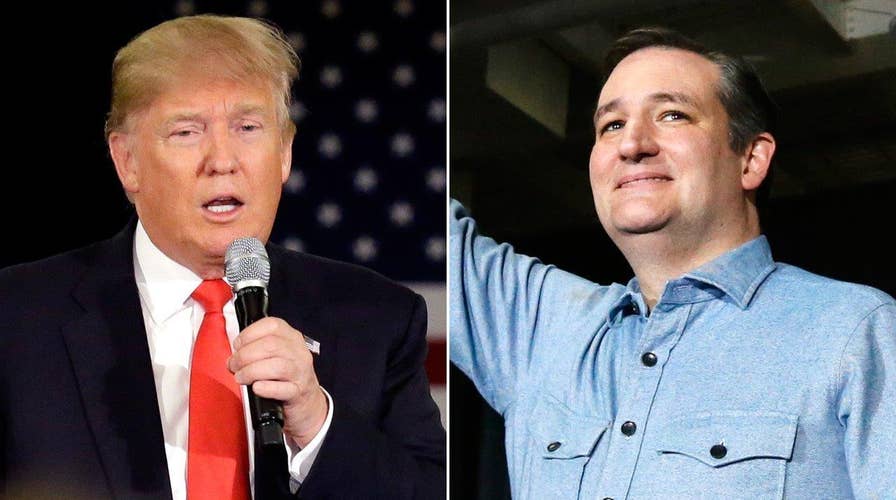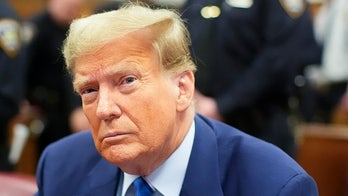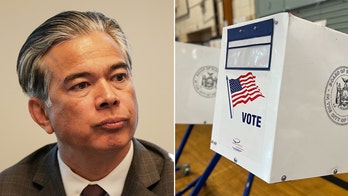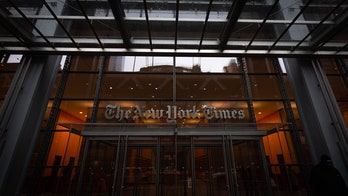Donald Trump and Sen. Ted Cruz took different approaches Saturday toward winning the GOP president nomination but stuck with the personal attacks in an effort to discredit each other’s campaign.
“Such deception and such lying,” the front-running Trump said about Cruz, at a rally in Racine, Wis., after one of the worst weeks of his campaign.
The Texas senator was, meanwhile, taking a quick detour from Wisconsin to make an appearance at North Dakota's Republican convention, where presidential delegates are being picked.
Convention-goers are scheduled to select 25 of their 28 national delegates on Sunday. North Dakota isn't holding a primary or caucus in the 2016 Republican race.
Still, before leaving Wisconsin, which holds its primary Tuesday, Cruz said Friday that making Trump the GOP nominee would be a “train wreck.”
Trump and Cruz are in a close race in Wisconsin, with Ohio Gov. John Kasich running third, according to most polls.
Trump and Kasich sent supporters to North Dakota on their behalf to make the case that they should be backed by the state’s delegates at the Cleveland convention in July.
Cruz earned an ovation in North Dakota when he said the state has become "a powerful energy haven" and that he would keep the federal government "the heck out of the way."
The outcome in Wisconsin could help determine whether Trump can seize the Republican nomination without a fight at the party's convention this summer.
Trump says his wife, Melania, is going to be joining him Monday at campaign events.
In Racine, Trump began the afternoon by defended a series of controversial comments in recent days on NATO, abortion and his remark that Japan and South Korea should perhaps be allowed to acquire nuclear weapons.
"This politics is a tough business because you can say things one way and the press will criticize you horribly,” he said. “You say it another way and the press will criticize you horribly."
Among his biggest missteps have been Trump's recent comments on abortion, which have managed to unite both abortion rights activists and opponents in their criticism.
During a taping of "Face the Nation" on Friday, Trump said he believed that, when it comes to abortion: "The laws are set. And I think we have to leave it that way." His spokeswoman, Hope Hicks, quickly issued a clarification that Trump meant that laws won't change until he's president and appoints judges who can interpret them differently.
It was the second time in days that he'd stepped in hot water over the issue. On Wednesday, he'd said women should be punished for getting abortions if they're ever banned -- a position the notoriously unapologetic campaign quickly reversed.
Trump told the audience on Saturday that his words had been repeatedly taken out of context, and complained that he was being held to a different standard than his rivals. He called his comments on "Face the Nation" "perfect" and "so good."
"They took words out that I said," Trump told the rally, implying CBS had edited his answer about keeping abortion laws as they are. But the video made clear there was no editing in the exchange about abortion and his response was given in full.
"It's a tough question," he added of abortion. "You know, 50 percent of the people hate you. Fifty percent of the people love you, very simple."
Trump's comments raised concerns in the Republican Party about whether his unpopularity with women as measured in preference polling would make him unelectable in a general election match-up against Democrat Hillary Clinton.
In an apparent effort to address that concern, Trump is bringing his wife on the campaign trail. His daughter Ivanka, who just had a baby, will also be returning to campaign with him in another week or so, he said.
Trump responded at length to criticism from both of his rivals as well as from President Obama over his call to consider allowing South Korea and Japan to acquire nuclear weapons -- a position the president said betrayed an ignorance of foreign policy and the world.
"Now I didn't say anything about letting Japan nuke," Trump said. "But I did say, perhaps if we can't do the right deal, we'll have to let them take care of themselves."
Trump said, "if that means they'll have to someday get nuclear weapons, in all fairness folks, I know the way life works, eventually they're going to probably want to do it anyway." And he later claimed that his much-panned assertion that NATO was irrelevant was suddenly being embraced by people who had "studied the organization for 30 years."
Trump said he was popular in some areas of Wisconsin but "in certain areas, the city areas, I'm not doing well. And I'm not doing well because nobody knows my message."
He said people were given misinformation, and partly blamed "crazy talk show hosts" including Charlie Sykes, with whom he had a contentious radio interview.
But Trump said he's hoping he'll be able to win some of those skeptics over as he campaigns across the Wisconsin -- and went so far to predict, in an afternoon rally in Wausau, that he would win the state.
The Associated Press contributed to this report.





